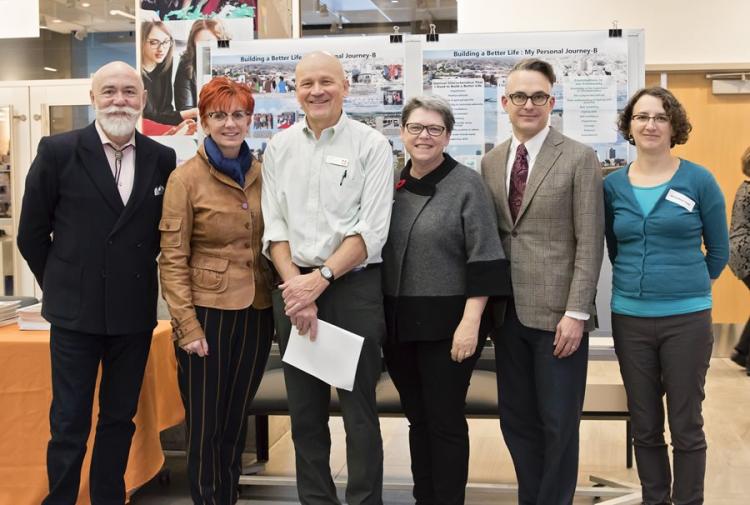Concentrating on how a lack of social capital affects loneliness, NorQuest College researchers publically released data on Year 2 of the Building a Better Life/Social Capital Study on November 8.

Research principals Robert (Bob) Marvin and Marlene Mulder (centre) are flanked by NorQuest and City of Edmonton representatives at the Year 2 data release showcase in the Sighmar Centre for Learning atrium.
Social capital refers to the bridging and bonding relationships that people use to function in society, thus enabling that society to function effectively. The study focuses on how social networks affect newcomers to Canada, Indigenous Peoples, and other historically marginalized individuals. The project is guided by the Indigenous seven sacred teachings: love, respect, wisdom, courage, honesty, humility, and truth.
The study is a joint research initiative between NorQuest College and the Edmonton Public Library.
"EPL is pleased to collaborate on this project to make a difference in the lives of Edmontonians," said Michael Sambir, director of service design at EPL. "Learning more about the results and participating in further research will allow us, along with our community partners, to put results into action to assist people in building a better future."
To date, more than 40 community partners have come forward to serve as collaborators on a project that aligns with the City of Edmonton and Councillor McKeen's initiative on Social Isolation.
"We are honoured to have leadership from local Elder, Elsie Paul, and local Wisdom Holder, San San Sy," said principal researcher, and NorQuest social work instructor, Robert Marvin. "These respected leaders in our community bring balance to our project."
Some of the key findings from the second round of collection show that of those surveyed:
- 39% have chronic medical conditions
- 21% struggle with substance abuse problems
- 56% experience discrimination
- 67% live under the low income cut-off
- 47% volunteer in their community
- 84% trust community serving agencies
The next and final round of data collection is taking place in November and December this year.
"The final round will help us learn from a broader range of participants who are struggling with substance use issues and those who experience discrimination," said Marlene Mulder, the project's co-principal researcher.
The project received a $239,000 grant from the Social Sciences and Humanities Research Council for three years of study.












